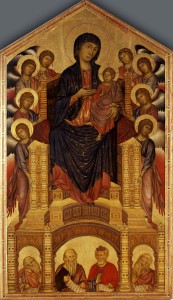Holland MI
Today, Christians will celebrate the birth of Christ. Commenters on these pages have in the past noted some tensions between the Porch’s localist themes and the universalist themes of Christianity; between our sense of place and a strain of Christian thought which stresses we are but pilgrims; between a sense of limits and a church universal.
Universality and particularity ought never really be thought of it too disjuncted a fashion, however. While God so loved the world that he gave His son, it is also true that He was born in a particular place, in Bethlehem, and performed His life’s ministry in a particular place as well. While God reigns above all mankind, He took on the particular form of human flesh and dwelt among us.
For those of us in Augustinian traditions, Christianity has been the source of our emphasis on place, limits and liberty. The Incarnation of God is seen within the context of the creation of the world itself, which we are assured is good, and of human community, which we are told is very good. The life and work of Christ is restorative. Christ comes not just to save us, but to bring the world to its proper balance, to order things rightly again, including our own souls.
Kings and magi alike tremble at this news. The powers and temptations of this world, when no longer rightly ordered, are unmasked by the infant in the manger. The poor and the lowly are filled with joy. We can now go about our lives with a renewed and restored confidence, with the reality of divine love flooding every part of our lives with a depth of meaning. We take up our plow, our wrench, our pen, with renewed care, knowing we are not in service of some self-serving power, but in the service of Him who has made us, and our work is now about caring for the good world God has given us out of His abundance.
Just as Jesus was born in a place, so are we all. Our places are the conditions of and not barriers to the restorative work of Christian salvation. Here, this place, is part of the good world God so loved. The command to be salt and light testify to the limits inherent in our callings in this world, for salt, used sparingly, will make this meal taste better; and light is directed on to this path, or into this room. The metaphors draw attention to our embodied natures.
It is a unique turn of Christianity to see God as taking on human flesh, humbling Himself while glorifying us. We are brought into the fulness of our humanity, each and every person endowed with the dignity of being made in the image of Christ.
The problems of the human condition are not overcome, but our final assurance of victory is fully granted us. Things are revealed for what they are. For example, as I have gotten older my children have moved away from home. This is how it ought to be, of course, although perhaps not as far away as some of them now live. Part of the joy of the Christmas season for me is the joy of having my children return, of having extended time with them under my roof, of breaking bread and playing games together again as a family. I feel restored and whole in a way I never can be when we’re apart.
As great as the happiness is, it is not definitive. Even as I take great joy in their company, I know it can’t last. Throughout the time of their visit, there is always in me a deep sadness, knowing that this is coming to an end soon enough, too soon, and they will be gone again and we will be broken. We eat and we play in the shadow of human finitude.
So it must be with the goods of this world. In the exchanging of gifts we acknowledge the goodness of things, their ability to bring joy and pleasure, the object standing as an expression of our love. But our gifts to each other cannot last. Who of us has not as children experienced the heartbreak of a cherished Christmas toy breaking the day after? Our gifts and our gatherings indicate our deep need and our deep longing for a joy that cannot and will not subside, for a being that never disappoints, for a love that is never satiated but always full, for a feast that goes on forever but never wearies us. We long for that union, for that deeper communion, that suffers no parting. And on this day, as Christians, we live in the confidence that the satisfaction of these longings is vouchsafed for us when God makes to us the gift of Himself. We enjoy our feasts and our gatherings knowing they are but a foretaste of the great feast and the great gathering that God has planned for us.
On behalf of the editors of the Front Porch Republic, I pray each of our readers may enjoy the deep and profound gift of Christmas, the love of family, the warmth of friendship, and the promise of life fulfilled.





2 comments
Julia Smucker
“Just as Jesus was born in a place, so are we all.”
I’m more inclined to emphasize: Just as Jesus was a nomad, with no place to lay his head, so are we all.
Yet both are true. This is a paradox of the Incarnation – which is a sort of paradox in itself – but not a contradiction.
Incidentally, your benediction here, after a few too many a trite and sugarcoated “Merry Christmas”, is a veritable balm.
Thomas McCullough
Thank you. May the Christmas blessings of God grace you and yours also.
Comments are closed.